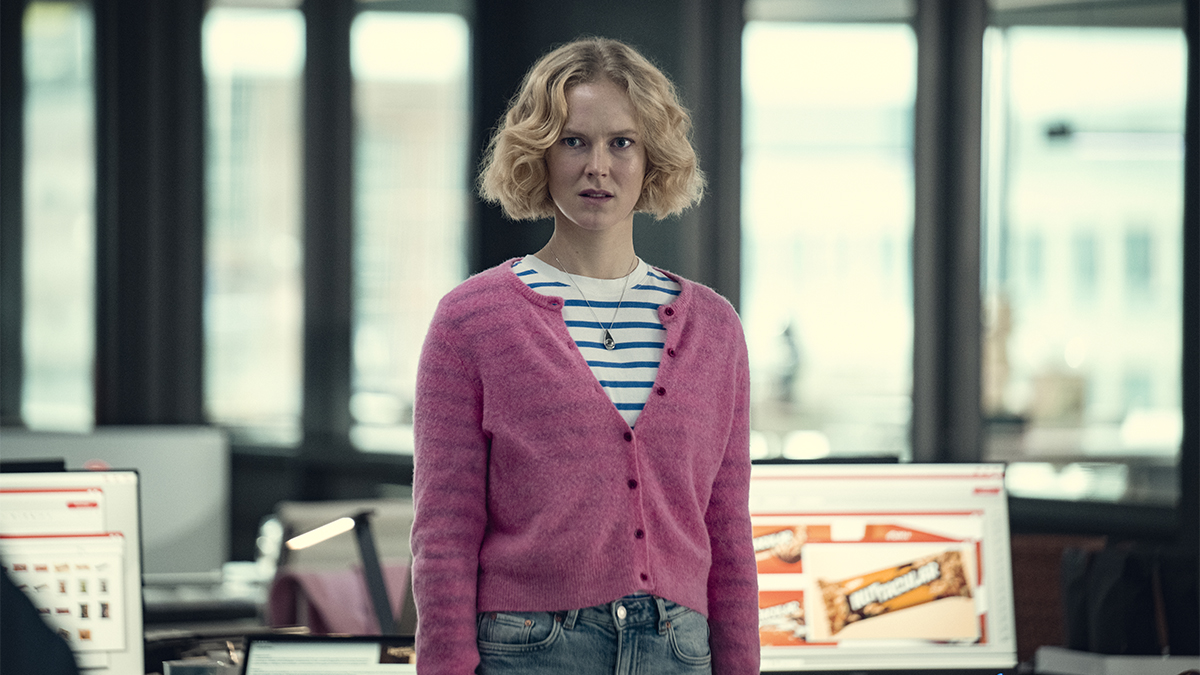
WWW.DENOFGEEK.COM
Black Mirror Season 7 Episode 2 Review: Bête Noire
Warning: contains spoilers for Black Mirror episode “Bête Noire”.
It’s done it. Black Mirror has finally delivered its most horrific, depraved vision yet: a universe ruled by someone who thinks that miso is an appropriate addition to a chocolate bar. Honestly, what sick mind comes up with this stuff?
That’d be writer Charlie Brooker, who can now use “Bête Noire” as Exhibit A in his unending clarification to interviewers that Black Mirror isn’t cynical about technology; it’s cynical about the people using the technology. In the 50-minute episode, directed by USS Callister and Demon 79’s Toby Haynes, a genius invents a computer powerful enough to reshape the world in any form, but instead of conjuring up a disease and poverty-less utopia, she chooses to torture her high school bullies to death. As Brooker has continually explained since Black Mirror’s arrival, tech ain’t the problem – we are.
The tech in “Bête Noire” remains hidden for most of the episode, which presents as a domestic dramedy before exploding into a balls-out sci-fi in its final moments. It’s bottom-heavy, with most of the good stuff packed into the end, but led by two compelling performances – a naturalistic one from Domino Day’s Siena Kelly, and a heightened, unpredictable and compelling one from Blue Jean’s Rosy McEwen. The first half-hour plays out as a psychological mystery and then reveals itself as a gaslighting story about the deepest of deep fakes.
Set in fictional UK food manufacturing company Ditta, we follow Maria (Kelly), a Head of Flavour who’s poised to launch her latest invention – the aforementioned miso abomination. When Maria’s former classmate Verity (McEwen) arrives out of the blue to take a job in her department, Maria is unnerved… with good reason.
Not that anybody, from boss Gabe (Ben Bailey-Smith) to boyfriend Kae (Michael Workeye), believes her, Maria thinks that Verity is out for revenge. At school, Maria had been part of the popular group who bullied Verity and spread a damaging rumour about her. When Maria discovers that one of her old school gang recently took her own life after losing grip on reality (the very suicide reported in the TV news report playing in the background of the opening scene), she suspects retribution.
Retribution is exactly what Verity has planned. All those weird little diagrams she used to draw of systems she wanted to build led her to create a “quantum compiler” that gives her omnipotent power. Like the monstrous little boy in The Twilight Zone episode “It’s a Good Life”, Verity can change reality on a whim. She’s used her compiler to – as she tells Maria in an expertly delivered line in their final confrontation – be everything and do everything. None of it though, satisfied her because her sci-fi superpowers couldn’t change her unhappy past. So, she’s taking action by hurting the people that once hurt her.
(Of course, changing reality isn’t only something that Verity can do with her remote-control widget; Maria does it too when she edits the story she tells to Kae about her schooldays. To avoid blame for starting the rumour that plagued Verity, Maria casually rewrites her past and recasts herself as a bystander instead of a participant in the bullying.)
Brooker’s script quickly establishes Maria as the perfect candidate for being gaslit (deliberately manipulated and misled about her sanity). She’s a pedant whom we first meet correcting her boyfriend on the location of a potential holiday destination. Used to being right, she’s so fixated on petty detail that she corrects every misuse of the confectionary term “marshmallow” to “mallow”, even when it’s done by the head of the company. Changing realities that Maria knows to be fact is a silver bullet for a character like hers. Verity’s scheme is also helped along by the casual sexism of Maria’s boss and boyfriend, both of whom put her complaints down to stereotypical female jealousy and competitiveness.
Verity’s plan works like a charm, until Maria fights back at the last moment. After an Everything Everywhere All At Once-ish demonstration of the compiler’s capabilities, Maria doesn’t kill herself but shoots Verity dead, takes control of the reality-change machine and wishes herself the Beyoncé-styled Queen of the Universe. Well, according to Kae, she always did like to be top dog. It’s a fun surprise that ends this fantasy-tinged episode on a cliffhanger that promises to become a fable about the dangers of getting what you want.
“Bête Noire” may seem slight and low-stakes compared to other Black Mirror episodes, but it touches on big themes through a small lens. How far ‘reality’ can be trusted now that search engines spew out AI hallucinations as fact and chatbots skew info to suit the biases of whomever they were programmed by, is a crisis of our time.
Join our mailing list
Get the best of Den of Geek delivered right to your inbox!
Not only of our time: in the 1940s, George Orwell warned about the past being rewritten in the most famous dystopia ever published. In Orwell’s 1984, the doublethink was enforced by totalitarian violence, in “Bête Noire”, sci-fi magic “retunes our corporeal frequency” to one of an infinite number of parallel realities where the alt-reality has always been the case, but it’s the same trick. Big Brother insisted that Oceania had always been at war with Eastasia to control its population; Verity changed the name of a fried chicken chain restaurant to mess with Maria’s head; and AI is turning the internet into a slagheap of brainless misinformation to make billionaires more money. Anybody have a pendant they can use to zap us out of this reality?
All six episodes of Black Mirror season seven are streaming now on Netflix.
0 Commentarios
0 Acciones
81 Views


